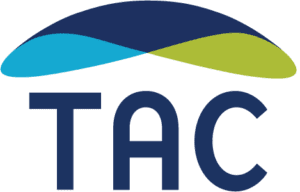Pandemic to Permanent Housing: Preventing a Crisis and Seizing an Opportunity
TAC is honored to have assisted in the Louisiana Housing Corporation’s outstanding “Pandemic to Permanent Housing” effort, which was recognized by the National Council of State Housing Agencies (NCSHA) with an Award for Program Excellence in the “Special Needs: Combating Homelessness” category.
Early in the pandemic, TAC joined the Louisiana Housing Corporation (LHC) in its efforts to provide non-congregate shelter to an unsheltered population in New Orleans. When the first round of Emergency Solutions Grant-COVID-19 (ESG-CV) allocations were announced, LHC immediately moved to expand this work into an initiative that would provide unsheltered people throughout Louisiana with non-congregate shelter — a push that required close coordination with every Continuum of Care in the state, as well as local and state government. TAC staff members Jenna Espinosa, Ellen Fitzpatrick, Eric Gammons, Nicole LiBaire, and Melany Mondello, along with consultant Michele Williams, helped determine how non-congregate shelter would look throughout the state, developing program guidelines, spending projections, and budgets. The team established ongoing communication with CoC subrecipients via biweekly implementation meetings, monthly implementation trainings, and the introduction of a fiscal agent. To meet the urgency of the moment, TAC staff even provided on-the-ground support, helping to locate people living in encampments and bring them to hotels.
However, the award bestowed by NCSHA recognizes not only LHC’s response to the immediate crisis, but also the agency’s determination to direct energy and resources activated by COVID toward the longer-term goal of preventing and ending unsheltered homelessness. With this priority in mind, TAC helped LHC to design an overall ESG-CV strategy that started with providing non-congregate shelter to the most vulnerable people while also focusing on providing everyone with exits to permanent housing, including a very large ESG-CV rapid rehousing program and homelessness prevention services.
A Framework for Implementing the New 988 Suicide Prevention and Behavioral Health Hotline
In 2020, Congress passed the National Suicide Hotline Designation Act to establish 988 as an easy-to-remember suicide prevention and mental health crisis hotline. In “Implementation of the 988 Hotline: A Framework for State and Local Systems Planning,” Senior Associate Jordan Gulley, Human Services Director Francine Arienti, Executive Director Kevin Martone, and David de Voursney have created a multifaceted resource for a range of stakeholders to use in organizing, planning, implementing, and sustaining an effective 988 crisis call system.
988 presents a unique opportunity for the behavioral health system, law enforcement, 911 systems, and other stakeholders to strengthen crisis response capacity. With a July 16, 2022 deadline set by Congress, there are critical considerations for which states must account in their planning efforts. Now is when leaders should rethink how the crisis system currently operates, and articulate a clear vision.
TAC Staff in Action
TAC Senior Associate Jordan Gulley and Associate Jennifer Ingle are leading trainings this month for homeless provider organizations affiliated with the Palm Beach County (FL) Division of Human and Community Services, on de-escalation techniques & safety, motivational interviewing, and trauma-informed care; Associate II Jenna Espinosa and Senior Associate Ashley Mann-McLellan facilitated a series of shelter transformation action planning convenings with executive leadership from the City of Boston, consumer advisory councils, providers, and hospitals to turn promising practices from using non-congregate sheltering during the pandemic into a citywide Shelter Transformation Action Plan; at this year’s online National Association for Rural Mental Health conference, TAC Executive Director and NARMH president Kevin Martone facilitated a panel on “Navigating Funding During & After COVID-19,” Senior Associate Nastacia’ Moore joined a panel on “BIPOC, LGBTQI+, and Rural Mental Health: Intentional Efforts to Ensure Equity,” and Senior Associate Jordan Gulley facilitated a session offering an updated national overview of rural crisis services; Project Support Specialist Ari Rogers helped prepare an article on the housing challenges faced by transgender and gender-nonconforming people exiting incarceration, in support of a forthcoming revision of the HUD-supported resource From Locked Up to Locked Out.


